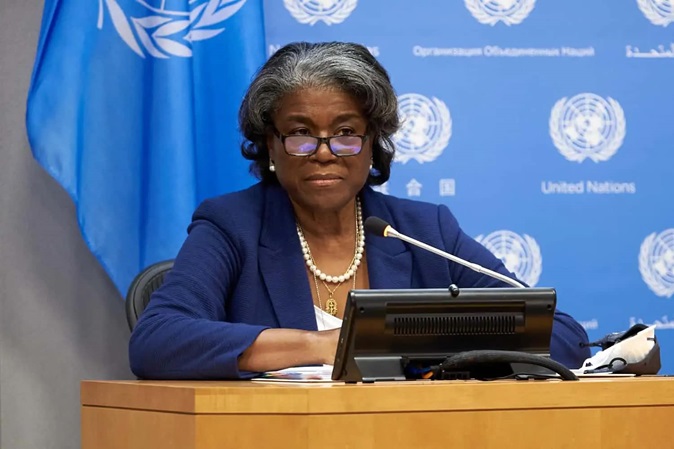Ambassador Linda Thomas-Greenfield
U.S. Representative to the United Nations
New York, New York
October 30, 2023
Thank you, Ambassador Verveer, and all of our colleagues here. I particularly want to thank my colleague from Japan and the Georgetown Institute for Women, Peace and Security, and the Sasakawa Peace Foundation for co-hosting this important conversation.
You know, far too often, when I walk into a meeting like this, the vast majority of people around the room are men. And so, I was really delighted when I walked into this room, that this is not one of those types of meetings. But it really does happen sometimes. I kind of looked around the room, and I had to find the men at the table – except for my colleague here. But we really have to address this. We have to call it out. And sometimes when I walk in the room, I’ll call it out. I’ll ask, “Why are there not more women around the room? Where are the women on this issue?”
And I understand it will make people feel uncomfortable sometimes, but I think it’s okay to be uncomfortable when you’re being called out on things that are important. There is growth in discomfort. Because we need men and we need masculinity to step up and speak out, such as what Dr. Barker just did. We really need men as allies. Women should not always have to be the ones calling out gender imbalances.
And too often, when discussing Resolution 1325, and Women, Peace, and Security, we don’t focus on the role that men can play and should play as allies and as leaders, because many of them are sitting in the leadership seats. So, if they’re sitting in the leadership seats, we have to put the pressure on them to support these issues of women, peace and security. And particularly with regard to peace processes and mitigating conflicts. We have to also support women leaders and coordinate peacekeeping efforts through a gendered lens.
When I think about the period when I was in Liberia and seeing a woman president leading a country, coming out of war, and being surrounded by women. And the top leaders in the country were the president, me as the U.S. Ambassador, the largest donor, and the SRSG Ellen Løj, who really was a powerhouse there. And we called ourselves the female truckers, because we were able to bring about change, together, in that country; and confront men, who still were in leadership positions there, who were still trying to do everything they could to bring down the women who were in that country. So again, we have to support women leaders, and we have to coordinate peacekeeping efforts through that gendered lens, as I stated.
And historically, the gendered consequences of violence have not been included in the narrative of conflict. And that also, is something that needs to change. Increasing women’s engagement and participation in formal peace and security processes is not just better for women it is better for everyone – for entire communities, for entire countries.
And we have to address the fact that too many men often play what I would consider gate-keeping roles and fail to prioritize the meaningful participation of women and girls in peacemaking. And taking this on, we will enhance decisions, we promote responsible stewardship, and inform tailored efforts to minimize, rather than perpetuate the inequalities that drive conflict and undermine peace. This is vital, as patriarchal gender norms – including violent masculinities – are a key driver of conflict and instability.
Again, using my experience in Liberia, and as I was listening to Gary speak, there were so many men in Liberia who were also victims. And they were victims of their own society, where men and boys, at very young ages, were forced into fighting. They were forced into using sexual violence against women. And I remember sitting in a room full of young boys who had been boy soldiers. And as I sat in the room with them, none of them had light in their eyes – not a single one of these boys. And everybody looked at them as bad people. And I remember in one case, one young man, with one leg and one arm came to beg, and my driver said, “Oh, don’t talk to him; he’s a killer.” And I looked at him and I said, “He’s a victim.” He too is a victim of this war, and we have to help these boys understand their victimization, but also help them understand how not to victimize others in the future. We have to take that on.
I also recall being in Afghanistan and meeting with Afghan women. And having those women say, “I hear you on the education of our girls. It is so important that you educate our girls. But if you don’t educate these boys, these girls will be stuck with uneducated men. They will have to marry uneducated men who will take their rights away from them, even though they’re smarter than them.” So, we have to have a holistic approach.
So, I was really excited when I saw the title of this: “Engaging Men as Allies in Women’s Peace and Security.” We have to work to ensure that we bring everyone around the table to ensure that we get a holistic approach to dealing with issues of gender, and this is a message I think we all have to carry.
We need to have the men at the table; thank you Ambassador. We need you as allies, we need you as advocates. It is important that we all work together to fully live up to the premise of women, peace and security. To live up to the promise of that agenda.
Thank you.







